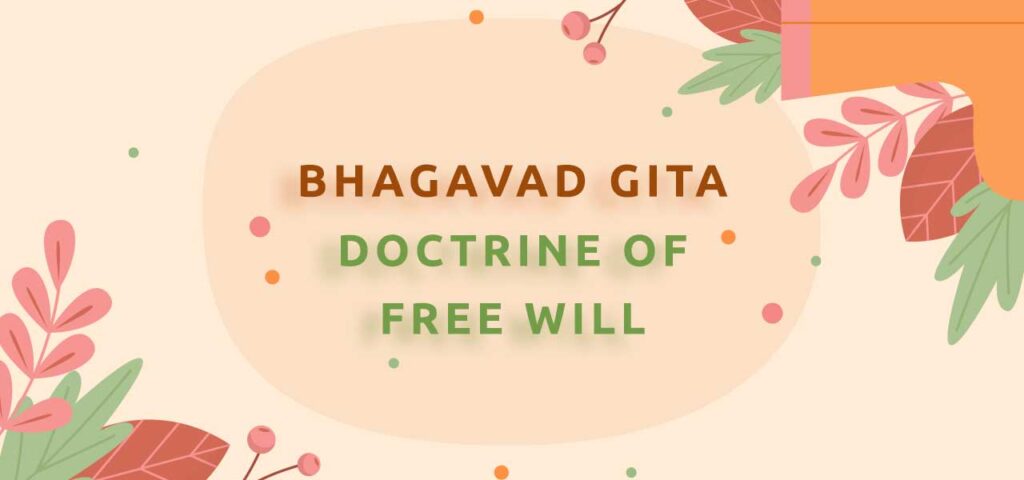Path of Bhagavad Gita is not the path of compulsion. It is rather the path of free will. It is the path of self-realisation where honest and considered opinion of the individual is not only not despised but is valued highly. No dogma is thrust upon the throat of the gullible.
God has granted freedom of choice to man. But that freedom cannot be an unfettered freedom. It must be exercised diligently keeping in view the ultimate purpose of life.
After explaining the philosophy of life completely and after imparting all-encompassing materialistic and spiritual knowledge, Krishna Bhagavan at the end of his discourse told Arjuna :
‘I have thus described to you this wisdom, which is more secret than all secrets. Reflect on it fully and then do as you choose to do’ (Shloka 18.63).
During the dialogue with Arjuna, Krishna had thrown ample light on different aspects of life, had explained pros and cons of everything, had stated the desirable and undesirable traits of human behaviour ; and had also revealed different paths of self-realisation. After elaborating everything, He asked Arjuna to think about it seriously and then do as he wished to do. Krishna left the decision to Arjuna’s choice. It implies that God does not impose His will on anyone. He has granted free will to man so that in the given circumstances, he may make an appropriate choice.
But the choice cannot be an impulsive choice. It has to be a well considered decision. That is why Krishna asked Arjuna to reflect fully upon the wisdom imparted to him, and then decide what to do and what not to do. Krishna did not ask Arjuna to follow his teachings blindly. He was given the freedom of examining His advice critically and then apply the understanding so gained to the situation at hand.
God can only illumine the path, but He cannot force the man to walk on that. He can teach man. He can guide him. He can advise him. He can support him whenever he falters. But neither would God compel man to act nor would He ever act on his behalf. One has to act for oneself. Moreover, one has to oneself face the consequences of his nobel or evil deeds. No one else would ever come to suffer for one’s sins.
Gita, thus, emphasises not only on the individual’s freedom of choice but also on the manner in which such choice is excercised. One’s decisions should be guided not by impulses and passions but by spiritual wisdom. If we do not rise above our selfish motives and our conduct is not guided by buddhi, the intelligence, we can become victims of lust, which on earth is the biggest enemy of man.
Man as soul is the subject, who experiences life ; and as mind-body complex, he is the object of experience. The Divine wants that man, the subject, should gain mastery over man, the object. He wants that everyone should attain perfection. That is why He has revealed the secret spiritual wisdom to man. At the same time, He wants that one should seek Him not impelled by any fear or force but out of his own volition. Man should choose to be one with the Supreme and make conscious efforts to attain that unity.
Why is the wisdom declared by Krishna called more secret than all secrets ? Gita has discussed in detail the metaphysical concepts such as Atman, the soul, Pramatman, the Supersoul ; and the relationship between the two. It has also revealed as to how jivatman, the embodied soul, can attain liberation. Such spiritual knowledge which is so profound cannot be realised through direct perception. Hence, it has been termed as secret knowledge.
Krishna is the teacher who taught his pupil Arjuna all the truths of life, step by step. Krishna persuaded Arjuna not by the fear of violence, but through inexhaustible love. He permitted him to ask any question and share any doubt. He listened to him patiently and answered each and every question. Each and every doubt was also dispelled. Instead of imposing His doctrines, Krishna wanted Arjuna to understand His teachings and form his own opinion. One can follow his chosen path with greater conviction when he has the satisfaction that his ideas are his own ; and not imposed by anyone else. That is how the Supreme Lord imparted most valuable knowledge to man and permitted him to follow it in the manner he deemed fit.
To conclude, everyone has to seek the Supreme in his own way. God is ever willing to offer His grace. But to get it, one has to deserve it. Therefore, one must choose his path of liberation with care and walk on it with conviction.
Due to the free will so granted to man, the teachings of Gita are said to be liberating and not binding.


Awesome content I have ever seen on internet , Thanks for sharing.